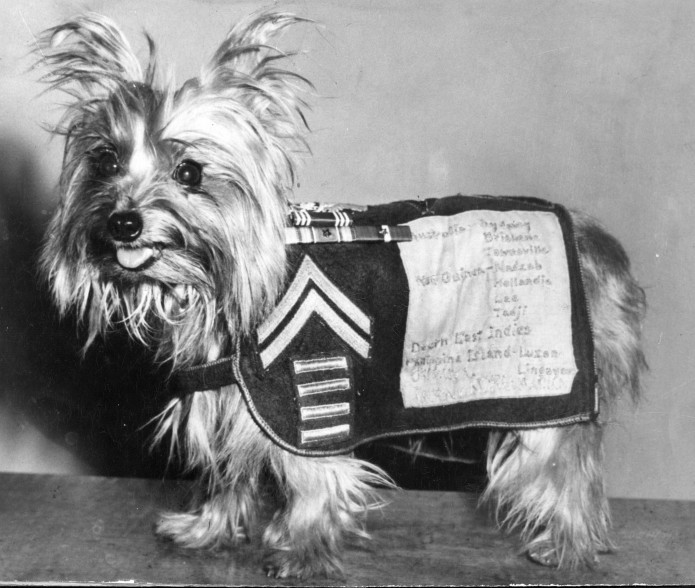Dogs at War: Smoky, a Healing Presence for Wounded WWII Soldiers
By Rebecca Frankel for National Geographic
Smoky
Every day waves of Japanese planes attacked the Allied airfield at Lingayen Gulf on Luzon, the largest of the Philippine Islands.
The onslaught was taking a toll on communication, and the American commanders urgently needed to run telephone lines through a pipe that stretched roughly 70 feet underground from the base to three separate squadrons, but they lacked the proper equipment.
So instead, they pinned their hopes on an unconventional solution: send a tiny Yorkshire terrier through the pipe with kite string tied to her collar. The string could then be used to thread the wires through the pipe. Calling to her, coaxing her forward was her owner, Corporal Bill Wynne, a 22-year-old Ohio native, who'd adopted her while he was in New Guinea.
The little dog reached the other side, the communication network was established, and she was credited with saving the lives of some 250 men and 40 planes that day. But in the years to come, the little Yorkie would achieve much greater acclaim for her healing effect on wounded soldiers.

Finding Smoky
When Wynne first set eyes on this dog in March 1944, while he was stationed with the U.S. Army Air Corps in Nadzab, New Guinea, she'd seemed almost too small to be taken seriously, weighing a mere four pounds, standing only seven inches tall, with a head the size of a baseball.
One of his tent mates had found her in an abandoned foxhole on the side of the road and was willing to sell her. She was underfed and scrawny. And because another soldier had thought the small dog was too hot under all her fur, he'd crudely sheared her, leaving her once-long, silky hair sticking out in uneven tufts.
But Wynne, who had been around dogs all his life, quickly decided to keep this scraggly little animal, and so he shelled out the soldier's asking price, two Australian pounds ($6.44 U.S.)—a fair chunk of his overseas pay—and called her Smoky. And during the next year and a half, Wynne and the little dog would survive air raids, typhoons, and 12 combat missions together.
Not long after Wynne adopted Smoky, he caught dengue fever and was sent to the 233rd Station Hospital. After a couple of days, Wynne's friends brought Smoky to see him, and the nurses, charmed by the tiny dog and her story, asked if they could bring her around to visit with other patients who had been wounded in the Biak Island invasion. During the five days he spent in the hospital, Smoky slept with Wynne on his bed at night, and the nurses would collect her in the morning to take her along on patient rounds, returning her at the end of the day.
The duo's repertoire started modestly enough with basic commands, and Wynne soon had his diminutive charge playing dead. When Wynne would point one finger at her and yell "bang!" not only would Smoky fall over to the ground at the command, but she also would lie there listless while Wynne came over to poke and prod her and even as he lifted her from the ground.
Eventually, he trained her to walk a tightrope, ride a handmade scooter, and even "spell" her own name—Smoky would pick up the large cutout letters in her mouth as he called them out to her.
Word of their act spread, and while Wynne and Smoky were on convalescence furlough in Australia, they were invited to perform at a few hospitals. As he watched the men in wheelchairs holding Smoky in their arms, he could see the difference that the tiny dog was making. "There's a complete change when we came into the room," he says. "They all smiled; they all loved her."
Smoky was hardly the only dog aiding in the recovery of wounded veterans in the aftermath of the Second World War. At an Air Force convalescent home in Pawling, New York, the medical staff witnessed the remarkable effect one dog had on a reluctant patient, completely changing his mental outlook. After that, they brought more dogs into the hospital and eventually built a kennel on the grounds to house them all.
The trend caught on, and in much the same way patriotic owners volunteered their dogs to serve with American forces fighting overseas, they brought their pets to serve as hospital dogs to provide uplift for injured soldiers as they recovered from their wounds. By 1947 civilians had donated about 700 dogs. In many ways, these dogs were the first therapy dogs, whose curative abilities were not only recognized but also harnessed to great effect.
After the war was over, Wynne and Smoky continued to tour hospitals, bringing their act to recuperating soldiers back home. Smoky retired in 1955, and she died in her sleep two years later in 1957 at the age of 14.

1 comment:
I have two dogs. They make me feel good when I am feeling down.
Post a Comment